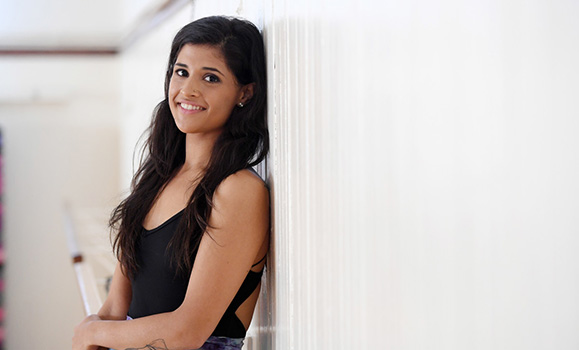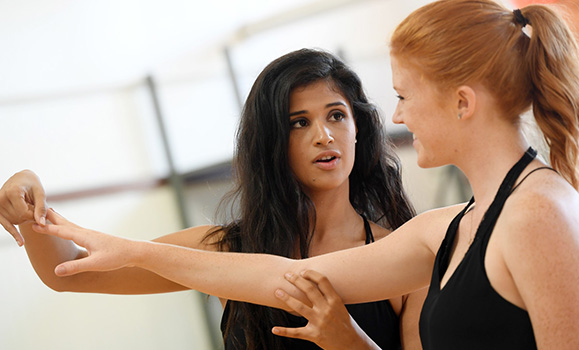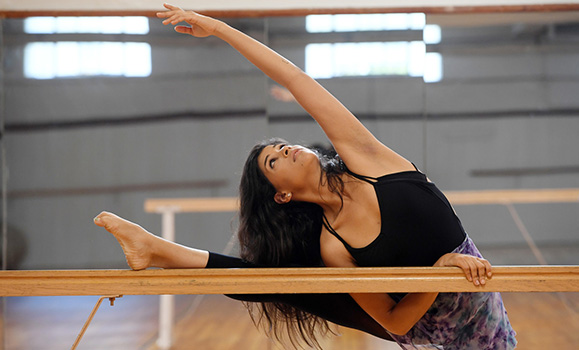At first glance, Dominique Salh’s interests seem so diverse as to be completely independent of each other. But the Vancouver-born graduate student has found a way to connect them in her short time in Halifax.
As a student in the Clinical Vision Science program, Dominique is pursuing a master’s degree in science while building the skills required to succeed in an optical profession. As a former competitive dancer and dance teacher with a passion for serving marginalized communities, she is building a one-of-a-kind program called Our Dance Safe, which provides safe spaces to learn dance basics and enjoy a communal experience.
Dominique began developing Our Dance Safe at the YWCA in Vancouver this past summer, knowing that she would be bringing it to Halifax with her when she began her graduate program. Planning for the two-city program included the launch of a in August, through which the program received financial support to begin its first classes for women, children and transgendered persons residing at Adsum House shelters in Halifax.

“I’m interested in those people who don’t feel like they have somewhere to be,” says Dominique of her program’s intended audience. “Combining my performing arts background, my interest in those populations and the trend for health and getting active, I’m creating a program that I didn’t see existing before.
“We’re amplifying a safe zone through social acceptance and physical and creative activity."
A supportive space
One of the distinguishing characteristics of Our Dance Safe is that it doesn’t require any dance experience or knowledge from its participants.
Dominique, who began dancing at age three, competing by age six and teaching competitive dance by age 16, says her own dance background helped her personal maturation process — but that Our Dance Safe is focused on the enjoyment of the experience than the pursuit of a particular goal.
“There’s absolutely no expectation of dance knowledge. There’ll be no foreign vocabulary, like you often see in the movies,” she says. “More importantly, there’s no expectation for growth in subsequent weeks.
“Here, every class can be basic. It’s exactly what people who don’t have experience might need and might not get elsewhere.”
In addition to running classes at Adsum House, Dominique has partnered with an occupational therapist at Mobile Outreach Street Health to offer classes to homeless, insecurely housed and street-involved individuals in the city.

Her efforts have earned notice from media outlets such as Metro. They’ve also caught the eye of university administrators such as Alice Aiken, dean of Health Professions, and Darren Oystreck, director of the Clinical Vision Science program. These officials, along with several other students, faculty and staff members, are currently working to help Dominique bring Our Dance Safe to campus.
“If Dal can host, we can widen the population we can serve,” says Dominique, who envisions a program that welcomes participants of all genders, sexual orientations and backgrounds. “It’s also an opportunity to integrate people into the Dal community.”
An opportunity to learn
Launching Our Dance Safe on campus is an ongoing project, for which Dominique is looking for input from the student community. She’s encouraging students to contact her through social media (@ourdancesafe on and ) or email about preferred class times and volunteer issues as she aims for a January start on campus.
Kick-starting a program like Our Dance Safe would be nearly a full-time commitment in its own right, yet Dominique says she’s been able to integrate it into her life as a first-year Clinical Vision Science student.
“There’s a real opportunity to learn here. We are completely immersed in the eye clinic and hospital rounds,” she says. “We’re already dealing with the technology that orthoptists and ophthalmologists get to use on a daily basis.
“I’m loving it so far.”
The reputation of the university and the unique program offering is what drew Dominique, who earned her undergraduate degree at the University of British Columbia, across the country.

“Not only does (the program) offer the clinical side of orthoptics and the use of ophthalmic technology, but it also allows us to do our master’s in science at the same time. And that is something that doesn’t exist anywhere else in North America.”
Between her program of study and the program she’s created for marginalized populations, Dominique is pursuing multiple passions simultaneously. Her studies will be the foundation of her own future, while Our Dance Safe promises to leave a valuable legacy in the community.

